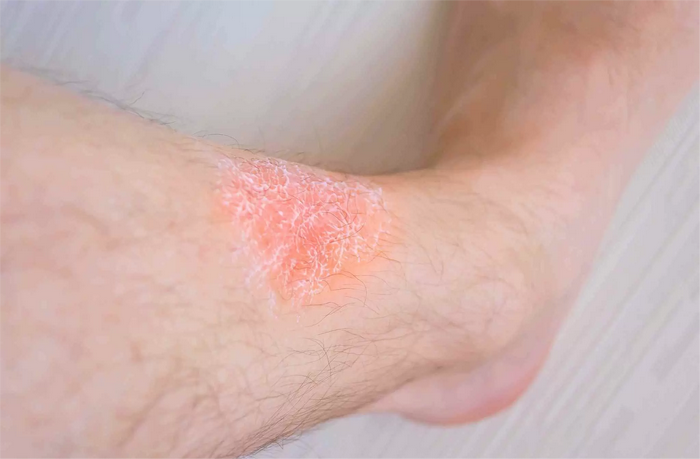Eczema, also known as atopic dermatitis, is a common skin condition characterized by red, itchy, and inflamed patches of skin. While eczema itself can be challenging to manage, there’s an additional complication that can arise: infected eczema. This condition occurs when bacteria, fungi, or viruses invade the already compromised skin of individuals with eczema, leading to further inflammation and discomfort. In this article, we will delve into the causes, symptoms, and treatment options for infected eczema, providing a comprehensive guide for those affected by this challenging skin condition.
Understanding Eczema and Its Vulnerability to Infection
To grasp the concept of infected eczema, it’s essential first to understand eczema itself. Eczema is a chronic inflammatory skin condition that affects millions worldwide, often beginning in childhood. The skin of individuals with eczema is particularly sensitive and prone to dryness and irritation due to a compromised skin barrier. This weakened barrier allows allergens and irritants to penetrate more easily, triggering inflammation and itching.
In eczema, the skin’s protective outer layer is deficient in certain proteins and lipids, making it less effective at retaining moisture and protecting against external threats. This vulnerability extends to potential infections. When the skin is inflamed and scratched due to eczema, it becomes more susceptible to colonization by harmful microorganisms.
Causes of Infection in Eczema
Several factors contribute to the increased risk of infection in individuals with eczema:
1. Skin Barrier Dysfunction: The primary cause is the impaired skin barrier in eczema, which allows pathogens to penetrate and infect the skin more readily.
2. Excessive Scratching: Itching is a hallmark symptom of eczema, and constant scratching can break the skin, creating entry points for bacteria and viruses.
3. Moisture and Warmth: The warm, moist environment created by eczematous skin can be an ideal breeding ground for bacteria and fungi.
4. Compromised Immune Response: Eczema is associated with an abnormal immune response, which can impair the skin’s ability to fight off infections effectively.
Common Pathogens in Infected Eczema
Infected eczema can be caused by various pathogens, including bacteria, fungi, and viruses. The most common culprits include:
1. Staphylococcus aureus: This bacterium is frequently found on the skin of individuals with eczema and can cause severe infections when the skin barrier is compromised.
2. Herpes Simplex Virus (HSV): Eczema herpeticum is a rare but serious complication of eczema caused by HSV, leading to widespread viral infection and systemic symptoms.
3. Fungi: Yeasts such as Candida can proliferate in moist, warm areas of eczematous skin, leading to fungal infections.
Symptoms of Infected Eczema
The signs and symptoms of infected eczema can vary depending on the causative organism but often include:
1. Increased Redness and Swelling: The affected area may become more inflamed and tender than usual.
2. Pus or Drainage: Bacterial infections can result in the formation of pus-filled blisters or sores.
3. Worsening Itching and Pain: The itching and discomfort may intensify with an infection.
4. Fever and Malaise: Systemic symptoms like fever, chills, and fatigue can occur with more severe infections.
Diagnosis of Infected Eczema
Diagnosing infected eczema involves a thorough examination of the affected skin and may include:
1. Visual Inspection: The healthcare provider will assess the appearance of the skin and look for signs of infection.
2. Swab Culture: A sample of any pus or fluid may be collected and tested to identify the causative organism.
3. Skin Biopsy: In rare or severe cases, a small sample of skin may be taken for microscopic examination.
Treatment Options for Infected Eczema
The treatment of infected eczema aims to control the infection while managing the underlying eczema. Common approaches include:
1. Topical Antibiotics: For bacterial infections, topical antibiotics such as mupirocin or fusidic acid are often prescribed.
2. Antifungal Creams: If a fungal infection is suspected, antifungal creams like clotrimazole or ketoconazole may be used.
3. Oral Medications: In severe cases or systemic infections, oral antibiotics or antiviral medications may be necessary.
4. Wet Dressings: Wet wraps or compresses with antimicrobial solutions can help soothe and heal infected skin.
5. Corticosteroids: In some cases, topical corticosteroids may be used to reduce inflammation, but caution is needed to avoid exacerbating the infection.
Preventive Measures and Lifestyle Modifications
Preventing infections in individuals with eczema involves maintaining good skin care practices and minimizing triggers. Some preventive measures include:
1. Regular Moisturizing: Keeping the skin well-hydrated with emollients and moisturizers can help strengthen the skin barrier.
2. Avoiding Triggers: Identify and avoid triggers such as harsh soaps, allergens, and irritants that can worsen eczema.
3. Gentle Skincare: Use mild, non-soap cleansers and avoid excessive bathing to prevent drying out the skin.
4. Prompt Treatment: Seek prompt medical attention for any signs of infection to prevent complications.
Conclusion
Infected eczema presents unique challenges for individuals already struggling with the symptoms of eczema. By understanding the causes, symptoms, and treatment options for infected eczema, healthcare providers and patients alike can better manage this complex condition. Early recognition and appropriate treatment are key to minimizing the impact of infections and improving the quality of life for those affected by eczema. If you or a loved one has eczema and suspect an infection, consult a dermatologist or healthcare provider for personalized evaluation and treatment. With proper care and management, the impact of infected eczema can be reduced, allowing individuals to lead healthier and more comfortable lives.
Related Topics:
- Understanding Follicular Eczema: Causes, Symptoms, and Treatment
- Why Is Hydrocortisone Cream Used for Eczema
- What is Intrinsic Allergic Eczema

























